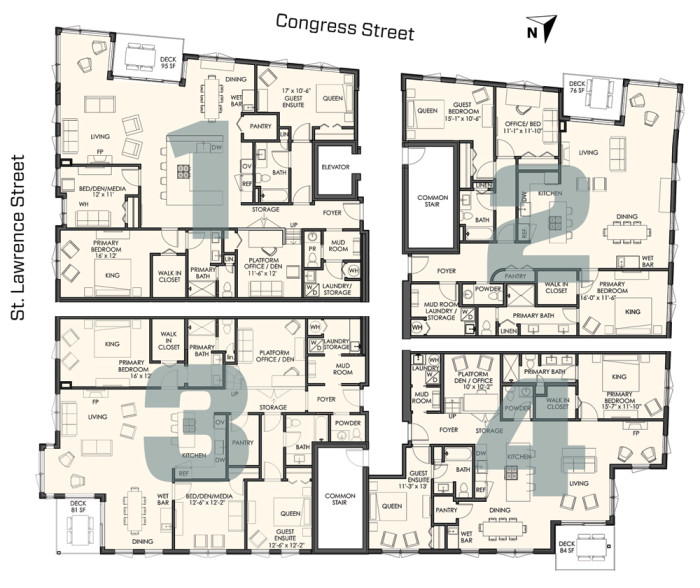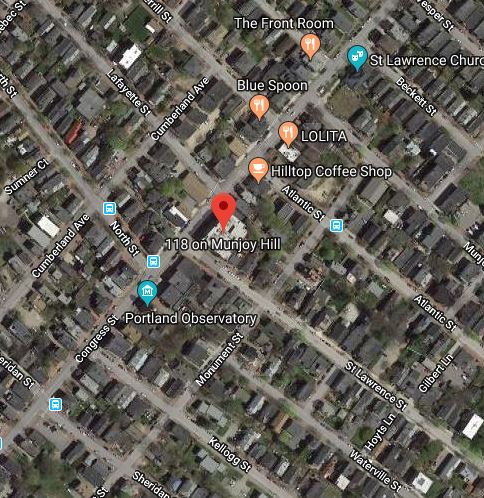Boats Now Cheaper than Homes.
Here’s a scoop about marine living that surprised us: Living on the water is probably a better deal than living near the water.
During the past 60 days or so, our little yacht design world has invested serious time in exploring how to live on marine environments. We’ve been digging deep into costs and benefits of various marine residence concepts from floating homes to houseboats to live-aboard yachts. And one of the biggest puzzles of living on the water are the values involved:
What’s a better deal? A residence on real land near the coast. Or a residence floating on the water near the coast. Let’s try to find out.

The Water: The Smart Housing Choice for Portland.
To get a sense of the tricky nuts and bolts of real estate values of properties near the water, let’s take a look at the hot housing market near Portland, Maine. The usually reliable real estate sales site Trulia pegs the average asking price of a home in this revitalized port city at about $450,000. We highlighted the lucrative areas in yellow the map to the right.
Real estate data like this are never perfect. Trulia highlights the “listing price,” which is almost always higher than the true closing price. And median rental rates can be misleading. But despite the numeric blurriness, Portland tells a healthy real estate story: Lucrative areas near downtown are doing well. And lower-priced markets, not far away, are ready for investors to pump in fresh cash and build valuable new inventory. That’s the kind of turnaround story that lures profit to a given neighborhood.
As an example. let’s take a closer look at two of our favorites in a rising Portland area: 118 On Munjoy Hill and Luminato Condos. Both are trendy, turn-around properties in neighborhoods up the hill from the downtown harbor area. Both are developed by forward-thinking developers, the NewHeight Group. Both buildings are attractive and well designed. It’s no surprise both buildings are sold out.
And both tell great stories about what’s worth what in coastal real estate.
A Marine Sense of Space: The Missing Element.

What’s interesting to our designer eyes is how little the average dweller would give up in amenities and space by living on a well-designed floating home, houseboat or live-aboard vessel. To us, the plans for 118 on Munjoy Hill offer about the same interior volume and features as one of our larger sailing yachts. All the basics in what’s expected in one of our boats is in these apartments: Sizable bedrooms, reasonable baths and nice places to cook and eat.
But we can’t help but point out that the space here could be better utilized. Here’s how:
- Lost Corners: Take a look at the number diagonally-facing chairs placed in odd shaped corners in these apartments. That all adds up to quite a bit of wasted space. Something like 30 to 40 square feet. That’s a lot of room that could be placed into wider staterooms or more roomy bathrooms — or just left empty to give a feeling of airiness and cleanliness.
- Lost Privacy: These units are classic higher density, urban blocks. And it struck us how cramped and close together these apartments are, when compared to similar floating residences found in officially zoned floating residences. To see how spacious floating communities can be, take a look at this aerial shot from the Eastlake region north of downtown Seattle. These are open breezy places to live, with excellent water views and great access to downtown.
- Munjoy Hill from the air: Portland is just another dense urban area, Are blocks of apartments really the only answer here?
- The Eastlake region from the air, just north of downtown Seattle. There is more room between homes. And more air and light. Lovely.
- Lost Value: But what really jumps out at us, is the price of these units in Portland. Munjoy hill units start at $600,000 and touch $1,000,000 for bigger spaces. We estimate floating residence are roughly 30 percent less than that for similar features. And we just 6 or 8 blocks from where these apartments are being installed. And if you consider taxes and maintenance, floating residences save even more money.
The waterfront won’t be child’s play.
We are not saying that putting homes on the water will be easy. It won’t. What’s allowed in any community is ruled by that community. In the United States, the water is all about local practices. And that can be complex. And poorly designed marine residences can be miserable. They need to be developed by smart builders that get the water.
But Portland, in particular, has a lot of unused marina inventory. It begs the question as to why the water as not being explored as place to not only boat, but to live.

